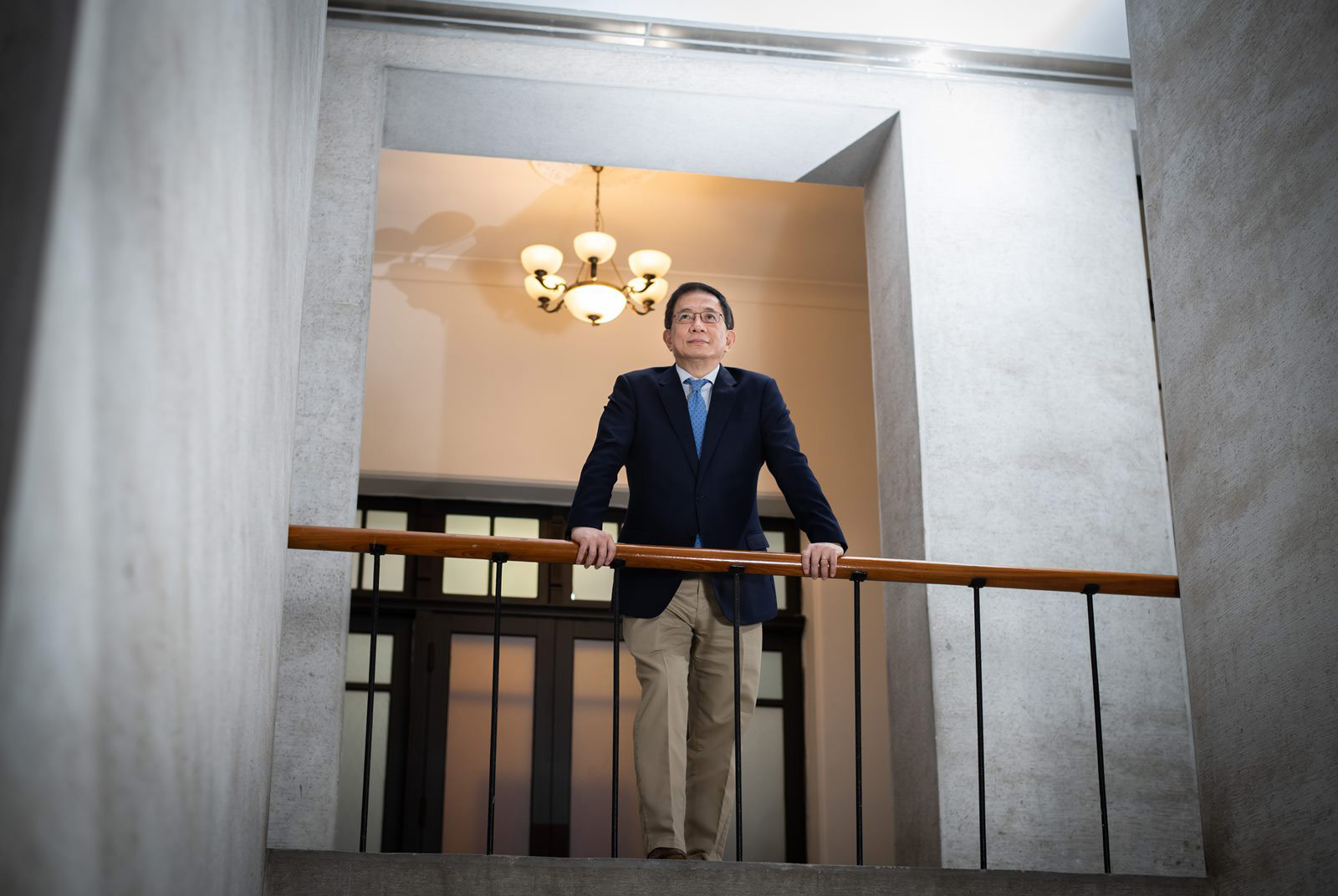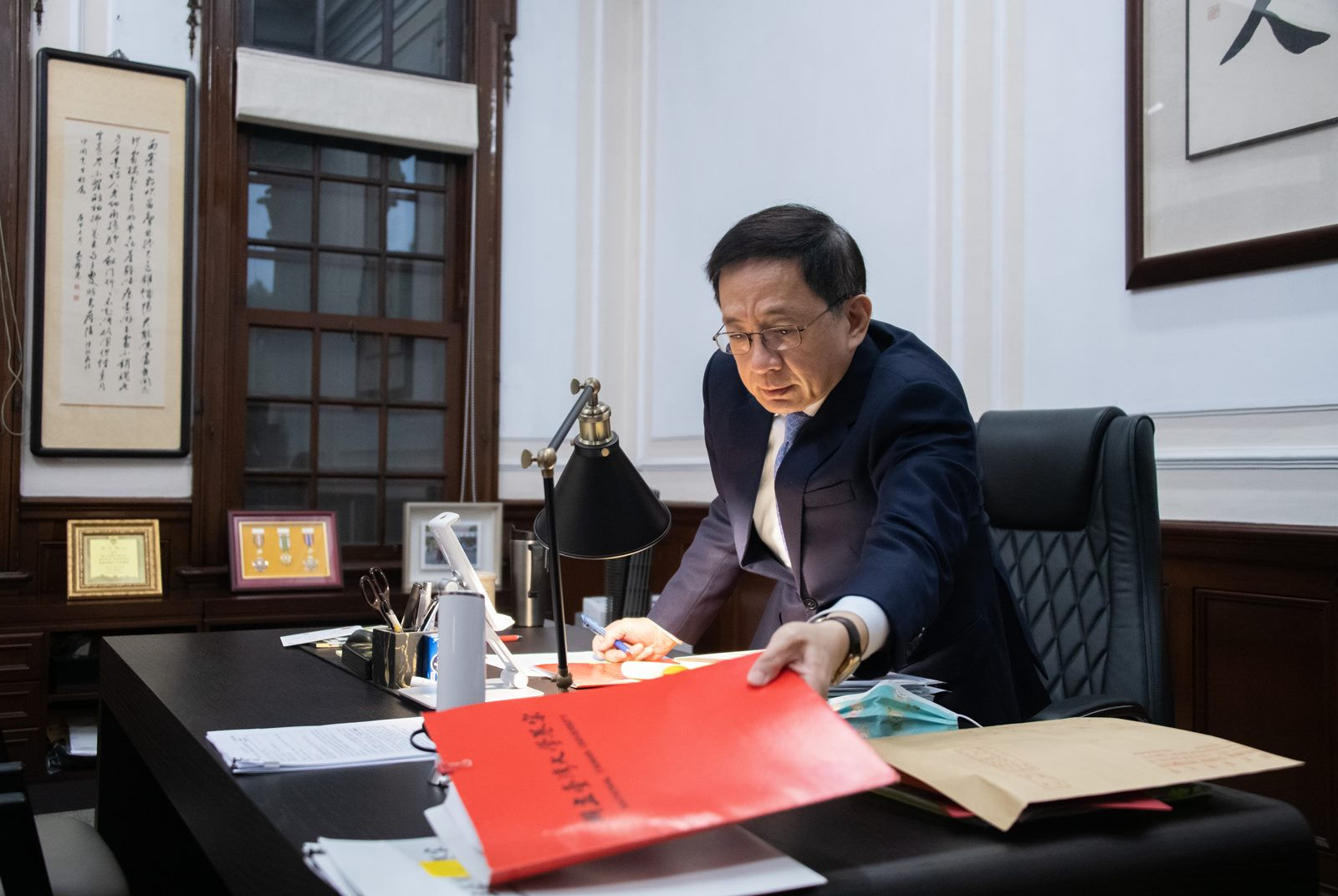NTU at 93: What does the future hold?

Source:Ming-Tang Huang
National Taiwan University President Kuan Chung-ming has been a strong proponent of a “Future NTU” concept to reinvigorate the nearly century-old school. But with Kuan deciding against a second term, where will NTU be headed in the future?
Views
NTU at 93: What does the future hold?
By Linden Chen, Hsin Yen HsiaoFrom CommonWealth Magazine (vol. 742 )
Two years after Kuan Chung-ming (管中閔) became president of National Taiwan University (NTU) in early 2019, the school made it into the top 100 of both the QS and Times Higher Education world university rankings for the first time.
At the same time, he has carried out his “Future NTU” vision, aimed at leading NTU to the forefront of higher education globally.
Under Kuan’s leadership, the face of the university has changed. But what does the future hold for this 93-year-old institution, especially as Kuan has decided against a second term that would start in early 2023?
Launched in 2019 and patterned after Stanford University’s “Stanford 2025” project, the Future NTU program is designed to create a learner-centric open university.
A key component of the concept is creating new courses catering to students’ needs and interests through a bottom-up process in which students brainstorm ideas with faculty and administrative staff. The goal is to help NTU break through the traditional bounds of higher education and improve its competitiveness internationally.
 (Source: Ming-Tang Huang)
(Source: Ming-Tang Huang)
The impetus behind the initiative was Kuan’s frequent interactions with the younger generation during his time in public office.
Kuan became head of the Council for Economic Planning and Development (now called the National Development Commission) in February of 2013. Among his responsibilities was laying the groundwork for innovative startups, putting him in touch with the needs and ideas of young entrepreneurs. The Sunflower Movement erupted a year later, with young adults taking over the Legislative Yuan to press their demands.
“I came to realize there was a huge gap in thinking between us and the younger generation,” he recalled.
That realization still reverberated in Kuan’s mind when he ran for the NTU president position. Not long after he took office, he appointed Chen Bing-yu (陳炳宇), a distinguished professor in the Department of Computer Science & Information Engineering, to lead NTU’s D-School and take the reins of the Future NTU program.
Though Kuan has championed the Future NTU concept, which has shaken up the venerable university’s longstanding foundation, he has avoided trying to put too much of his personal stamp on it. Chen still remembers that Kuan did not give him any specific instructions when he got the job, other than that he should hold nothing back.
Over the past two years, backed by discussions involving 2,500 people, the Future NTU program has launched several new initiatives, including an “Exploratory Learning” plan that encourages students to take time off from school to pursue their interests away from the university and get academic credit for doing so. A “Design Your Own Course” option, meanwhile, invites students to create a course they want to teach, and an “Alumni Learning Account” encourages alumni to continue their education at NTU.
Under the “Design Your Own Course” plan, after students choose the skill or topic they want to highlight, they prepare a course syllabus and post it on the NTU course platform. If more than 40 people endorse it, the course gets the green light. Once it passes a review, the school will provide a venue and the necessary equipment and funding for it to be held.
During the process, students who make the proposals learn about project management and gain teaching skills, while participants in the class get access to fresh new knowledge.
In an example of how far NTU has come, a student proposed a “Pole Dancing Culture and Practices” course, offering hands-on experience while also exploring pole dancing from sociological, historical, and gender perspectives.
“Instead of students who just go after grades, I would prefer that NTU students consist of all different types of people,” Kuan said of the new diversity of offerings.
Students who graduate from the Future NTU program may not get a diploma covering a single major or from a single department but rather one covering different disciplines and colleges or departments.
NTU’s dilemma: Finding good teachers/students
The Future NTU project may seem to be nothing more than a niche for Taiwan’s academic leader, but Chen said the university’s bold challenge of the higher education system reflects to some extent Kuan’s need to address a fundamental problem – the inability to find good students and teachers.
Many of Taiwan’s top high school students no longer see NTU as their top higher education choice, preferring to cast their lot overseas, which explains why Kuan is one of the few NTU presidents who has personally participated in recruiting fairs at Taiwanese high schools.
Maintaining a strong faculty has also been a challenge given the relatively high age of professors, with a third of them slated to retire in the next five years.
But instigating change at the 93-year-old school is like trying to move a dinosaur that is set in its ways.
“We’re starting with what we can do,” Chen said. That means treating the Future NTU project in its initial phase as an experiment or a movement to get the school’s teachers, students, and employees to ponder what really makes a university tick, find ways to loosen NTU’s existing structures, and explore new possibilities for higher education.
 (Source: Ming-Tang Huang)
(Source: Ming-Tang Huang)
Kuan’s ability to push the reform plan through may have been helped by his College of Management background. NTU chemistry professor Chou Pi-tai (周必泰) observed that most NTU presidents have come from either the school’s College of Medicine or College of Electrical Engineering & Computer Science. Because those colleges control a large share of NTU’s resources, Chou said, past presidents have come under pressure from their colleagues to proceed cautiously, unlike Kuan, who has had more leeway to stick to his principles.
“Over the past one or two years, there has been a big drop in the number of professors who have left. The best thing he’s done is retain talent,” Chou said.
According to Chou, Kuan’s success is due in part to his departure from the conservative approach of past presidents by visiting professors with potential or who have performed well academically and giving them raises.
What of Kuan’s reforms after he leaves?
Though drastic actions have been taken, Kuan’s experiment to reengineer NTU will clearly take more than four years.
The president of another public university said NTU’s university of the future initiative has drawn considerable attention but felt it would require the terms of several presidents before real change would be seen. There was little chance of finishing the job in a single term, he said, and even if it were possible, nobody could guarantee that the next president would stay the course.
Kuan is well aware of the challenge. “I’ve been in politics, and I’ve seen what it means when ‘the tea cools as soon as the person is gone.’” He has indeed considered the possibility that his reforms may not be sustained, but was confident that policies with broad support would remain in favor.
“This is not my university; it’s everybody’s university of the future…..It will be easy [for the new president] to overturn [my policies], but reversing everybody’s university of the future, that won’t be so easy,” Kuan said.
“I hope everyone remembers that, while there are many things that won’t be finished on my watch, they were started on my watch,” he said.
The Future NTU project will be Kuan’s final salvo of his career in public office. Only time will tell whether it leads National Taiwan University into its next 100 years and cement its standing as Taiwan’s higher education leader. But the 65-year-old Kuan, who has said he could live to the age of 110, could well have the chance to bear witness to how it plays out.
Have you read?
♦ Ella Wilkins – a homeschooler who thrives on online learning
♦ Covid Graduates: "The pandemic only makes us stronger"
♦ Aiming to Create a “Bilingual Nation”
Translated by Luke Sabatier
Edited by TC Lin
Uploaded by Penny Chiang






